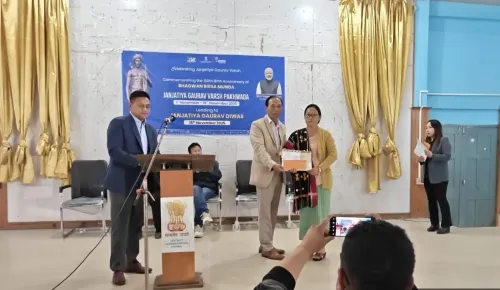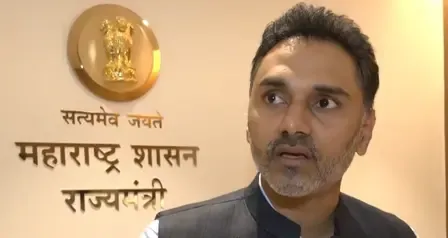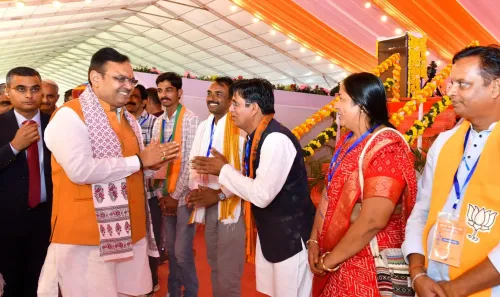Is Sanatan Philosophy a Fundamental Aspect of Human Philosophy? Mohan Bhagwat Explains

Synopsis
Key Takeaways
- Integral Human Philosophy is a contemporary interpretation of Sanatan philosophy.
- The core principle is Dharma, which signifies a universal outlook.
- True happiness is found within oneself, leading to global unity.
- India's diversity is a source of celebration and inclusion.
- Personal and societal welfare must be pursued simultaneously.
Jaipur, Nov 15 (NationPress) Rashtriya Swayamsevak Sangh Sarsanghchalak Mohan Bhagwat stated on Saturday that Pandit Deendayal Upadhyaya articulated the essence of Sanatan philosophy for contemporary society by framing it as Integral Human Philosophy, tailored to meet the demands of the nation, era, and circumstances.
He emphasized that although this philosophy was formally introduced 60 years back, its significance today resonates globally.
Bhagwat was addressing the Deendayal Memorial Lecture organized by the Integral Human Philosophy Research and Development Foundation in Jaipur.
According to him, the core of Integral Human Philosophy can be encapsulated in a single term: Dharma.
He clarified that Dharma transcends the concept of religion, sect, or creed; it represents a goal and a universal perspective that embraces all.
At this moment, he asserted, the world must embrace this Dharma of Integral Human Philosophy. He highlighted that Indians have historically not exploited or harmed others while abroad, contributing positively instead.
“Despite the changes in lifestyles, culinary practices, and attire in India over time, the eternal philosophy of integral humanism has remained unchanged,” he remarked.
He noted that its foundation lies in the belief that true happiness is found within oneself.
“Understanding this inner happiness leads to the realization that the entire world is one. Integral humanism is a philosophy devoid of extremism,” he asserted.
Discussing physical, mental, and intellectual strength, Bhagwat mentioned that all forms of power have limitations.
He pointed out the urgent need to pursue individual growth while being dedicated to the welfare of everyone. Citing frequent global economic upheavals, he remarked that India remains relatively insulated because its economic resilience is rooted in its family structure.
On the topic of rapid scientific advancements, Bhagwat observed that while material comforts have increased, peace and fulfillment have not necessarily followed.
He questioned the actual improvements in health despite the introduction of new medications, noting that some ailments arise from certain treatments.
Furthermore, he noted that only 4 percent of the global population consumes 80 percent of the world's resources, exacerbating the divide between developed and developing nations.
He expressed that India has always celebrated diversity, which has never been a source of conflict.
“Indian society has welcomed countless deities and continues to embrace more without difficulty. The world recognizes the existence of happiness for the body, mind, and intellect, but not how to attain all three simultaneously,” he stated.
According to Bhagwat, India possesses a unique understanding of this, as it believes in the holistic happiness of the body, mind, intellect, and soul.
Earlier, Mahesh Sharma, President of the Integral Human Philosophy Research and Development Foundation, introduced the program.
He remarked that the entire universe is interlinked, and the movement of even a single particle impacts the whole.
He also pointed out that this year marks the 150th anniversary of the composition of Vande Mataram, underscoring the importance of singing the complete song in current times.
The event was attended by various dignitaries, including Rajasthan Deputy Chief Minister Diya Kumari, Deputy Chief Minister Premchand Berwa, former Chief Minister Vasundhara Raje, BJP State President Madan Rathore, and several others. S.S. Agarwal, Director of the Health Welfare Group, offered the vote of thanks, and Narbada Indoria conducted the proceedings.









